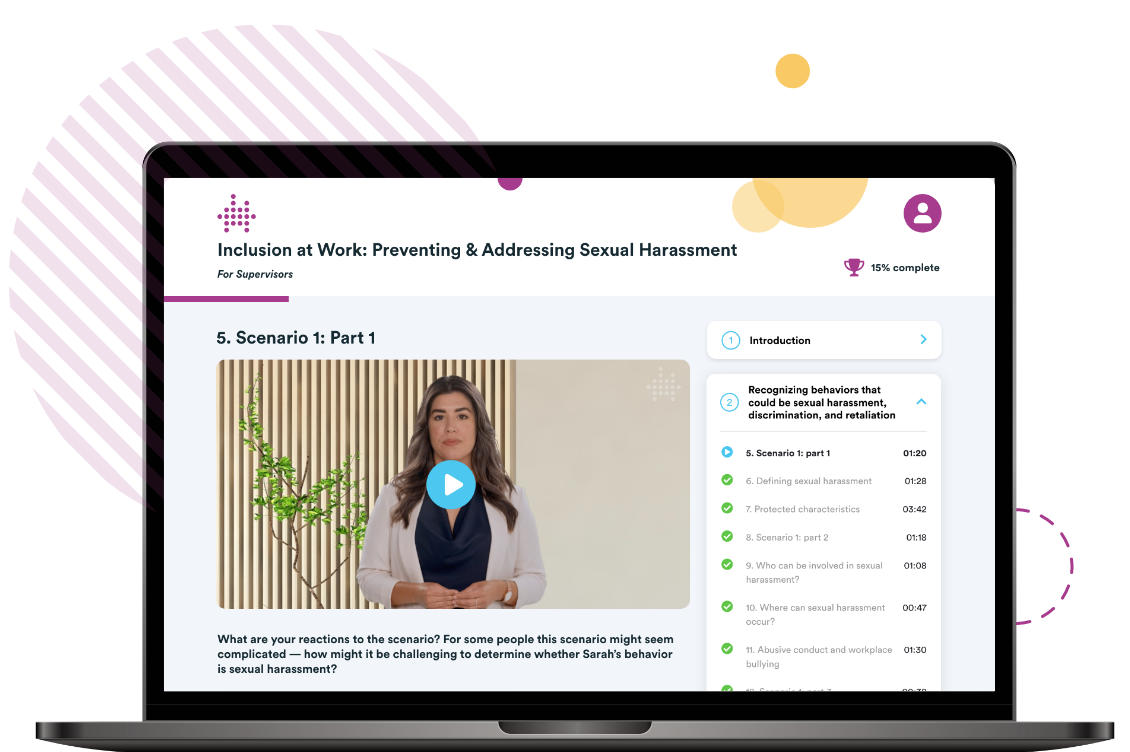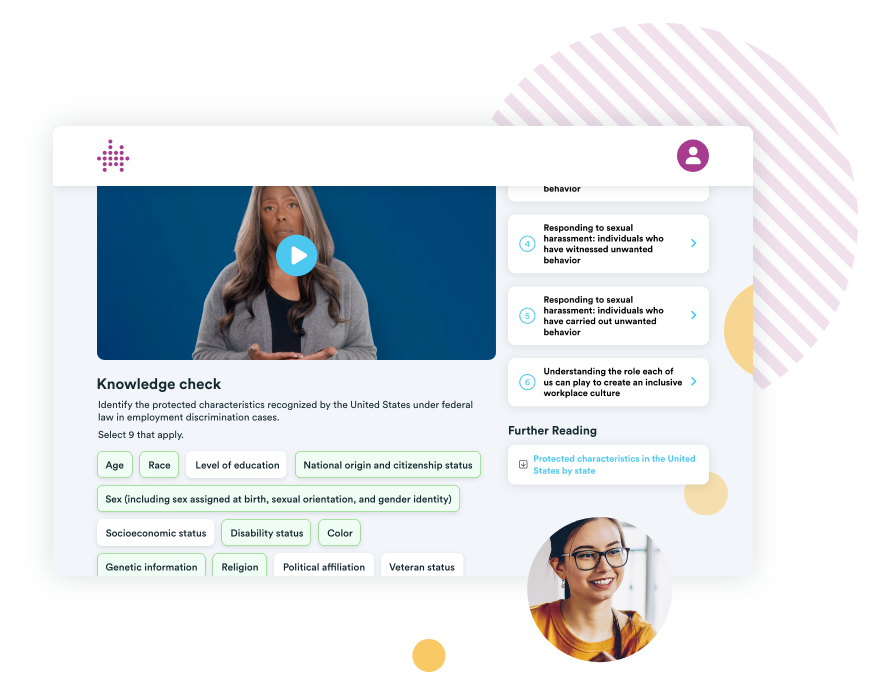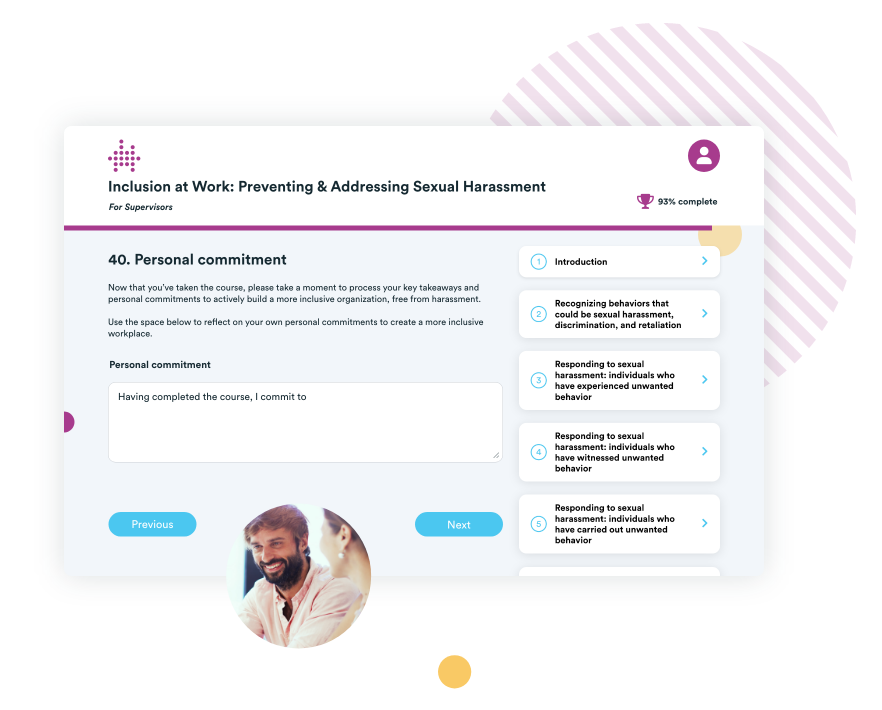Bring Inclusive Sexual Harassment Training to Your Organization
When I founded Paradigm, I was a civil rights lawyer focused on preventing and addressing discrimination and harassment in the workplace. I represented clients suing their employers, drafted state laws to promote workplace equity, and traveled around California facilitating “know your rights” trainings for people most susceptible to abuse. Ultimately, I was so frustrated by the reactive nature of my job — addressing problematic behavior, but never actually preventing it — that I decided to create Paradigm.
For the last eight years, we’ve focused on helping organizations build more inclusive cultures where the types of situations my clients experienced years ago are far less likely to happen. While we’ve designed training on a range of themes, like unconscious bias, allyship, inclusive leadership, and anti-racism, there’s one we’ve never addressed head-on — harassment prevention. Our customers have asked us for harassment prevention training for years, but we questioned whether enough organizations really cared about providing inclusion-focused sexual harassment training. Most, we figured, just wanted to check a compliance box. So we instead focused on areas where we felt we could make a greater impact.
Over the last few years, our perspective changed. We’ve seen a growing number of organizations focus on creating thoughtful, effective learning programs aimed at advancing inclusion. As they’ve rolled out these programs alongside outdated, ineffective sexual harassment training, we’ve seen a meaningful opportunity for change. Ultimately, organizations cannot build inclusive, equitable organizations without preventing and addressing sexual harassment. Our customers know this, we know this, and we’re excited now to be doing something about it.
Today, I am thrilled to announce that Paradigm is now offering online harassment prevention training that both meets legal requirements and helps companies foster more inclusive cultures.

Alt text: Paradigm harassment prevention training on laptop screen
The Problem with Existing Harassment Trainings
Most harassment trainings are designed with compliance in mind, which leads to a few key mistakes.
First, content focuses primarily on defining what is and isn’t “legal.” But what about situations that may not be illegal, but still undermine inclusion?
Second, content focuses on teaching would-be harassers how to avoid engaging in unlawful conduct at work. But with 26% of people reporting they’ve experienced harassment at work, your employees are much more likely to have experienced or witnessed harassment than engaged in it.
Too often, harassment trainings can traumatize people. People should not be required — especially at work — to watch people reenact forms of harassment they’ve experienced. In the same vein, awkward case studies or hypothetical scenarios can make training seem inconsequential and signal to employees that your workplace doesn’t take harassment seriously. As we’ve developed this course, I’ve heard from a shocking number of people that they filed or received HR complaints AFTER the training because it was so bad.
How Our Training is Different
Over the past year, we’ve been researching and designing a training that not only meets compliance requirements in all 50 states, but also avoids the problems I outlined above and actually advances inclusion efforts. Here are a few ways our training does that:
- We don’t just ask potential harassers to not harass people. Instead, we create an anti-harassment culture by empowering everyone else in the organization to respond if they experience or witness harassment.
- We cover a wider range of problematic behaviors, not just the illegal and egregious stuff. While we clearly lay out what is illegal, we also prompt people to think about a range of harmful actions that can make someone feel uncomfortable, whether they’re unlawful or not. When people are trained to respond to subtle instances of problematic behavior, it creates a culture where more serious forms of harassment are less likely to happen.
- Our training is trauma informed and grounded in restorative practices. We acknowledge that people engaging with the content may have experienced, witnessed, or perpetrated harassment, and that this type of training can bring up complicated feelings. We’ve been thoughtful and intentional in the scenarios we use to bring concepts from the course to life — we don’t use cringeworthy, triggering videos and case studies. The course is also designed to support people who have experienced harassment, giving them resources to seek care and equipping colleagues and supervisors with necessary tools for support.

Alt Text: Paradigm Harassment Prevention Training Interactivity
Bringing Inclusive Harassment Prevention Training to Your Organization
Our harassment prevention training is delivered online through Reach, our blended learning platform. It is facilitated by Paradigm experts Analia Stratton and Michelle Lopez, and includes:
- Courses for individuals and supervisors that combine videos, hypothetical scenarios, case studies, readings, and interactive elements.
- Compliance logs for organization’s HR, DEI, and Legal teams, and completion certificates for learners.
- Access to a robust library of additional diversity, equity, and inclusion trainings.

Alt text: Paradigm harassment prevention training personal commitment
Our harassment training meets compliance requirements in all 50 states! To learn more and sign up for a tailored demo, go here. You can also join me for a webinar diving into a modern approach to harassment training Sept. 22 — register here.
September 6, 2022

 Our website uses cookies to distinguish you from other users of our website. This helps us to provide you with a good experience when you browse our website and also allows us to
improve our site. By continuing to browse our website, you’re agreeing to our use of cookies. For more information, please read our
Our website uses cookies to distinguish you from other users of our website. This helps us to provide you with a good experience when you browse our website and also allows us to
improve our site. By continuing to browse our website, you’re agreeing to our use of cookies. For more information, please read our
